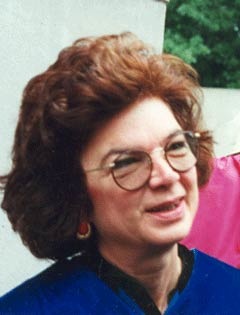

|

|
IN MEMORIAM
Susanna Barrows
Professor of History, Emerita
UC Berkeley
1944 – 2010
Susanna Barrows was born in Stamford, Connecticut, on November 29, 1944, and spent much of her early youth in Nevada, where she was selected one year as Little Miss Reno. She was educated at Smith College (B.A., 1967), Indiana University (M.A. in Victorian Studies, 1970) and Yale (Ph.D. in History, 1977). While at Indiana, Barrows worked at the Kinsey Institute, an experience that, she used to say, considerably broadened her archival range. She began teaching history at Mount Holyoke College in 1974, became an assistant professor there in 1977, moved to Berkeley as an associate professor in 1981, and was promoted to professor in 1992. She retired in 2010, shortly before her death on October 27, 2010.
Barrows wrote a brilliant first book, Distorting Mirrors: Visions of the Crowd in Late Nineteenth-Century France (Yale, 1981), about the rise of crowd psychology in late nineteenth-century France as a response to bourgeois anxieties about urban life, class conflict, and the status of women. She wrote there of alcoholism as a social as well as political problem that represented an unruly popular culture outside the control of authorities. Maintaining an interest in the cultural history of drinking throughout her life, Barrows edited two books on the theme with Robin Room (The Social History of Alcohol, 1988; Drinking, Behavior and Belief in Modern History, 1991), and gathered material for what was to be a vast and comprehensive study of café life in nineteenth-century France. At her death she was completing a more modest study that took up an aspect of her grand topic. To be called “The Coup of 17 May,” it was about the “parliaments of the people” as places where, through graffiti, popular songs, and seditious talk, the Third Republic was created in protest against state censorship and in favor of liberal tendencies in high politics.
Barrows was a historian of genius. This short survey cannot reflect that nor does it account for her importance as a teacher and scholar. Her national and international reputation rests on unquantifiable qualities. In the first place, her capacity to write and teach from some core of her being, some deep set of passions and commitments that went well beyond professional questions, was remarkable. “I have made this book out of myself, out of my life, and out of my heart . . . from my observation, from my relations with friendship and of neighborhood” wrote Jules Michelet, the great nineteenth-century historian whose sensibilities, sympathies, and love of France Barrows shared. One can say the same thing about her. She knew and loved Paris, France, and the French language intimately; she had a sympathy for the intimacies of French life, past and present, that shined through her work and, more important, her teaching and conversation.
Barrows also had a powerful synecdochic imagination that fed on an intimate knowledge of the things and places she cared about: furniture, wallpapers and linoleum, whippet bronzes, nineteenth-century cartoons, chinoiserie, food and wine, street life, cafés, and markets. From her uncle, Stanley Barrows, a distinguished historian of design at the Pratt Institute to whom she was close, she learned to appreciate all this. But more significant was her intuitive talent: she could improvise on some small, particular thing in the culture she loved with the virtuosity of a great jazz musician.
Her genius was of a special sort—not powerfully analytic, something stranger. One could say of Barrows what Tchaikovsky said of the conductor Arthur Nikisch: He really doesn't conduct, but, rather, "resigns himself to a magical enchantment." She taught and talked through a kind of magic that was as inexplicable as it was exhilarating. In some measure this was a consequence of her abilities as an academic salonnière: her monthly dinners with graduate students to discuss thesis chapters, and the Bay Area French History Group that she ran, were nationally famous venues where serious intellectual work was done and where scholarly community was made over three decades. She also had an uncanny ability to help each student find his or her own voice and topic in congenial and supportive circumstances. Barrows supervised almost 30 dissertations, 27 of which have so far resulted in published books on topics ranging from nineteenth-century diseases, public health, poor relief, and the morgue to the psychology of advertising after World War I and the creation of a national memorial site after 1945. There was no teacher of French history of comparable importance in this country. The Berkeley Graduate Division recognized her achievement in 2009 with the Sarlo Distinguished Graduate Student Mentoring Award.
Finally, there was something deliciously irreverent about Barrows. The voice of Michelet can speak for her again: "The historian's first duties are sacrilege and the mocking of false gods. They are his indispensable instruments for establishing the truth.”
Thomas Laqueur 2011
James Vernon
Mary Elizabeth Berry